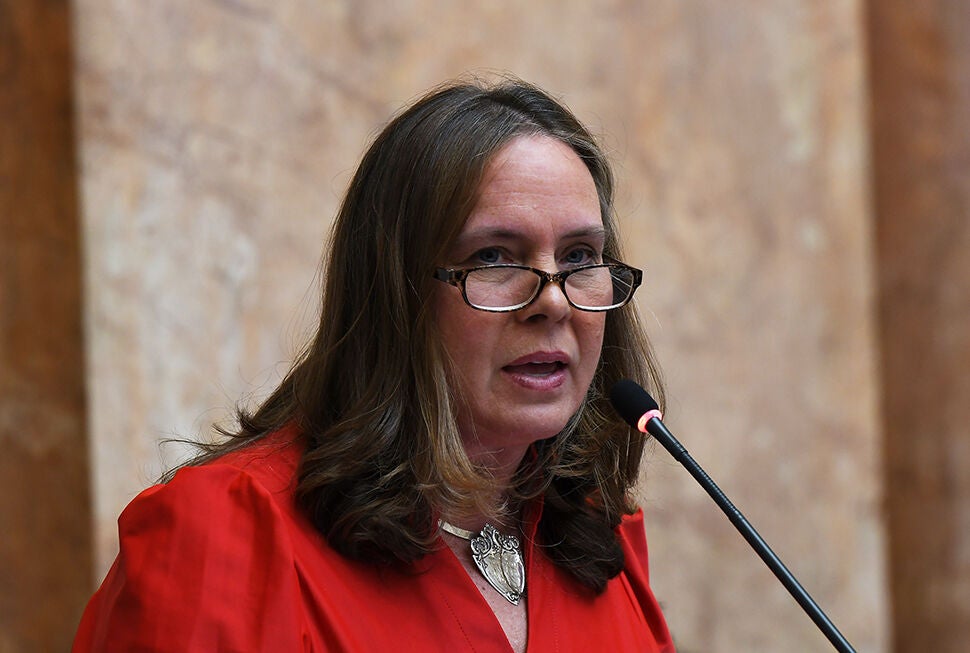Which constitutional amendments might be on the ballot?
Published 12:06 pm Monday, April 8, 2024

- House Majority Caucus Chair Suzanne Miles, R-Owensboro, presents House Bill 2, a proposed constitutional amendment related to education funding, on the House floor Wednesday. (Legislative Research Commission)
When lawmakers return to Frankfort Friday for the penultimate day of the legislative session, constitutional amendments will not be on their agenda.
Constitutional amendments do not need governor approval, but both the House and Senate must get 3/5ths of their members to vote yes for a shot to make it on the ballot. Then, before the Kentucky Constitution can be changed, a majority of voters must approve.
Up to four proposed constitutional amendments can appear on a ballot at once, but that has not happened since 1990.
While over two dozen proposed constitutional amendment were filed this session, only two got enough momentum to make it all the way. With only two days left, none of the proposed amendments that have not yet passed have enough legislative days to make it through the process.
School choice
One of the two passed amendments is House Bill 2, which would allow the state to fund non-public schools.
The school choice measure would amend the sections of the state constitution that require state taxpayer funds to exclusively be directed to “common schools,” or public schools.
If approved, lawmakers could come back in future sessions and decide which specific types of school choice they want to establish in Kentucky, potentially including private school vouchers or charter schools.
A dozen Republican representatives broke from their party to vote against the measure in the House, while two voted no in the Senate. No Democrats voted for school choice, but Sen. Robin Webb, D-Grayson, abstained from the vote.
Supporters argued that competition from new forms of schools would lift everyone up, while detractors said school choice measures like private school vouchers disproportionately boost already-wealthy families while doing nothing for the less privileged.
Banning non-citizens from voting…again?
The Kentucky constitution states that “(e)very citizen of the United States of the age of 18 years…” who has been a resident for a certain amount of time can vote.
However, this language hasn’t stopped the legislature from passing a proposed constitutional amendment—Senate Bill 143—that further clarifies that “no person who is not a citizen of the United State shall be allowed to vote” in Kentucky.
Republican supporters have argued that the constitution places a floor on voting but not an explicit ceiling. Sen. Jason Howell, R-Murray, cited an example of non-citizens in San Francisco winning the right to vote in school board elections in a 2023 court decision. Non-citizens cannot vote in any other election in California or elsewhere.
SB143 clarifies that non-citizens cannot vote in school district elections in Kentucky.
Opponents argue that the measure is redundant, and the state should focus on real issues. It passed both chambers overwhelmingly, with some Democratic support. One Democrat, Louisville Sen. Karen Berg, said she voted yes because she’d prefer SB143 take up space on the ballot as opposed to some other, worse constitutional amendment.
‘Dead’ constitutional amendments
Quite a few proposed constitutional amendments didn’t pass muster this session.
Changing General Assembly rules
House Bill 4 proposed changing the constitution to allow the General Assembly to call itself into session and change the end date upon 3/5ths approval.
A similar amendment made it on the ballot in 2022 but was voted down with 53% of the vote. HB4 got two readings in the House, but was never held for a vote, and does not have time to make it through the entire process.
Changing election years
Once again, Sen. Christian McDaniel, R-Ryland Heights, has fallen short on his perennial effort to change Kentucky’s election years.
Senate Bill 10 was McDaniel’s ninth attempt since 2013 to align Kentucky’s off-year elections for governor and constitutional officers to presidential election years.
McDaniel said the change would save money during the eliminated election year, including an estimated $20 million for local governments and $1.9 million for the state. Supporters added that it would boost turnout for state races and avoid an extra year of political ads.
Democratic opponents called the effort a clear “political measure” to nationalize races in today’s highly polarized environment instead of focusing on state issues.
After sailing past the Senate in the first few weeks of session, the measure has sat waiting for a committee assignment in the House. It never received one, and no longer would have time to pass.
Limiting governor’s pardon power
Another perennial McDaniel proposed amendment to limit the governor’s pardon power didn’t make it through this session.
While the measure got the most approval since McDaniel first introduced it in 2020, it also stalled in the House.
Senate Bill 126 would have banned the governor from granting pardons or commuting sentences from a month before elections to Inauguration Day.
The effort comes after former Republican Gov. Matt Bevin granted a series of controversial pardons of convicted rapists and murderers in his final days in office, after he had been defeated in the election.
McDaniel said pardon power should not be given to governors who will no longer be held accountable for their actions by voters.
Freezing property assessments
Sen. Michael Nemes, R-Shepherdsville, proposed Senate Bill 23, which would have amended the constitution to freeze property assessments for Kentuckians 65 and older.
Older residents would still pay property taxes, but their assessment would not increase. Nemes said the measure would help seniors on fixed incomes dealing with a fluctuating economy.
While the measure only garnered two no votes in the Senate, it never made it to a House committee vote.
Other failed amendments
Several proposed amendments would have restoring voting rights for felons after a specific amount of time upon completing their sentences.
Another pair of amendments would have officially ended slavery as a punishment for crime.
One amendment would have established term limits for members of the Kentucky House of Representatives and Senate, and another would have reduced the age qualifications to be elected.
A couple would have legalized possession and sale of small amounts of cannabis. None made it to a committee vote.





